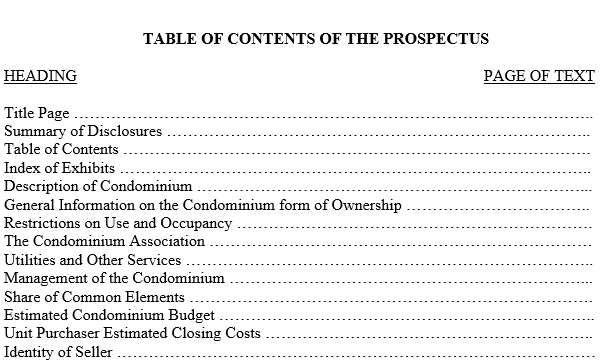Condominium Development: Condominium Prospectus Requirements in Florida
Reading Time: 4 minutes
Florida’s condominium market has gained strength in the past five years; traditional sales are up, and prices are rising. In Northeast Florida, Condominiums and Townhomes spent an average of 11 fewer days on the market than single-family detached homes. As the condo market heats up and real estate developers consider the feasibility of development projects, developers should know that, before they can begin selling condominium units, they must prepare and file a Prospectus with the Florida Department of Business & Professional Regulations, Division of Condominiums, Timeshares & Mobile Homes (the “Division”). This blog will address the basic requirements of the Florida Condominium Prospectus.
What is a Condominium “Prospectus”?
Section 718.504, Florida statutes, requires certain condominium developers to prepare a “prospectus or offering circular” for the project. This prospectus is more than a summary document describing the condominium project, it is a collection of the many documents that developers are required to provide to potential condominium purchasers. Fla. Stat. §718.504. This Prospectus must be filed with the Division and approved before the developer can enter into an enforceable contract to sell any units within the condominium, or enter into a contract to lease a unit in the condominium for a period of more than five years. Fla. Stat. §718.502.
Who is required to file a Prospectus?
The Condominium Act requires the “developer” of a new residential condominium or converted condominium, or a “bulk assignee,” or “bulk buyer” of certain distressed condominiums, to file a Prospectus with the Division. Developers of condominiums including 20 or fewer units are not required to prepare a Prospectus unless that condominium is part of a group of residential condominiums that is served by property used in common by more than 20 residential units. Developers of residential condominiums containing fewer than 20 condominiums still are subject to the disclosure requirements of Sections 718.502 and 718.503, Florida Statutes, which require submission of all the same documents that must be submitted for larger projects except for the Prospectus. Although most provisions of the Florida Condominium Act apply to both residential and commercial condominiums, Part V of the Act, which requires the Prospectus and details other pre-sale disclosure requirements, only applies to residential condominiums.
What must a Prospectus Include?
The text of the Prospectus must include statutorily mandated disclosures regarding the condominium form of ownership and a description of the condominium project. In addition, multiple exhibits must be attached to the Prospectus. Although Chapter 718, Florida Statutes, does not proscribe the order of information disclosed in the Prospectus text or establish a form for the Prospectus table of context, the following sample table of contents illustrates the types of information and documents that should be included in a condominium Prospectus:

This Table of Contents typically is followed by an Index of all of the documents that must be attached to the Prospectus as exhibits. The types of documents typically attached to a Condominium Prospectus are:
- Declaration of Condominium, including legal description, survey, articles and bylaws.
- Unit Floor Plans
- Condominium Rules and Regulations
- Estimated Operating Budget and Schedule of Unit Owner Expenses
- Financial Information for the Condominium Association
- Form of Unit Purchase Agreement
- Escrow Agreement
- Evidence of Seller’s Ownership Interest in Condominium Property
- Agreements and Permits for Maintenance and Operation
- Frequently Asked Questions and Answers Sheet.
Who should prepare the Prospectus?
Preparation of a condominium Prospectus is a laborious undertaking because it requires understanding of all of the requirements of the Florida Condominium Act, the drafting of multiple legal documents submitting land to the condominium form of ownership and creating the condominium owners’ association, and working with architects, surveyors, and administrative agencies to ensure that the exhibits to the Prospectus comply with Part V of the Condominium Act. Developers interested in selling units in a residential condominium should work with a Florida attorney who is experienced in filing Prospectuses with the Division.

